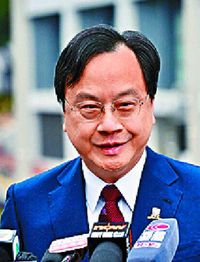Hong Kong is on the brink of a startup revolution, fueled by government support, educational initiatives, and significant investments. With its universities leading the charge in research and development, the city is poised to transform academic achievements into commercially viable innovations. The ambitious $10 billion RAISe+ program is a cornerstone of this strategy, aiming to foster collaborations between academia and industry. Floria Chan, senior vice president at Beyond Ventures, emphasized that this initiative provides critical funding to eight local universities. "The government typically supports startups in these sectors, and consequently, venture capital funds are likely to follow suit," she noted.
Hong Kong Science and Technology Parks Corporation (HKSTP) has been pivotal in this ecosystem, providing not just financial backing but also extensive training programs for emerging startups. CEO Albert Wong highlighted the need for young researchers to bridge the gap between innovation and commercialization. Starting in April 2025, their second Global Booster Programme will equip startups with business development skills and help them penetrate international markets.
The biotech sector is already thriving, with 45 new life sciences startups emerging between the second half of 2023 and late 2024, generating over HK$800 million in investments and 3,000 new jobs. Adrian Lo, partner at Strategy3, projects further growth in this area due to the infrastructural and financial support provided by HKSTP and the Hong Kong-Shenzhen Innovation and Technology Park (HSITP).
Fintech also continues to dominate the startup landscape, with HKSTP noting that 619 ventures were operational as of 2024. Amit Chu, partner at Verda Ventures, highlighted the growing trend of blockchain funding, which skyrocketed by 17 times from 2020 to 2024. “Blockchain and decentralized finance will pay off well for Hong Kong,” he said during our interview.
In a bold move, Hong Kong has positioned itself as a central hub for cryptocurrency innovation amidst China’s restrictive policies. Four cryptocurrency exchanges have recently gained approval, signaling the city's determination to lead in this sector. Ron Levin, managing partner at Alumni Ventures, pointed out that this regulatory framework is essential for attracting international players and fostering a cluster of startups focused on compliant digital finance and trade.
Furthermore, Hong Kong aims to establish itself as a leader in green technology and finance. Currently home to over 200 greentech companies, the HKSTP's GreenTech Hub is at the forefront of this transformation, providing a platform for innovation in environmental solutions.
As evidenced by the 82% growth in green startups between 2023 and 2024, there is strong momentum in this area. Wong stated that “Many institutions are looking to invest in greentech solutions,” marking a significant shift toward sustainability in the city’s economic framework.
Bronze accolades go to the health tech sector, which saw a 54% increase in startups to 275 by the end of 2024. The city, with approximately 4,700 tech firms and 40,000 to 50,000 R&D professionals, is competitive on a regional scale but still faces challenges against mainland cities like Shenzhen.
Reflecting on the current state of research, CUHK’s President Dennis Lo described Hong Kong as entering a golden era of innovation. With significant government investments, the InnoHK initiative supports billions in funding for projects, transforming the research landscape marked by only a few hundred thousand Hong Kong dollars two decades ago.
Lo stressed the urgent need for universities to modernize curricula, focusing on entrepreneurship and industry collaborations to nurture the next generation of innovators. He noted that courses on intellectual property and patent application should be prioritized to empower students.
Ethical challenges surrounding AI and its integration into sectors like healthcare were also addressed by Lo. While he praised its potential for enhancing diagnostics, he cautioned about liability issues and privacy concerns, emphasizing the importance of a comprehensive governance framework.
Amidst these dynamic developments, Hong Kong's aspiration to be an international cooperation hub for AI was echoed by Financial Secretary Paul Chan Mo-po. However, with Hong Kong ranking 16th in the 2024 Global AI Index, the city must create a robust strategy and infrastructure to bolster its position.
Chan’s call to action invites clear steps for future AI development, showcasing Singapore as a potential model for effective governance and collaboration in the AI landscape.
As this transformation unfolds, the momentum generated from supportive government initiatives, innovative educational frameworks, and a vibrant startup culture suggests that Hong Kong may indeed solidify its place on the global innovation map. The convergence of all these elements positions Hong Kong uniquely within the Asia-Pacific region, amidst methodologies that empower not just research, but the commercial applications necessary for sustained economic growth.






